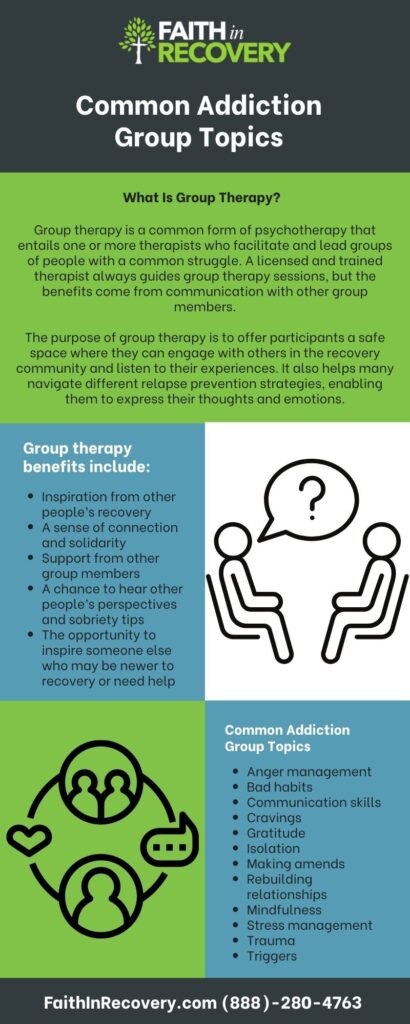
What Does the Bible Say About Enabling?
February 21, 2023
Celebrating a No-Alcohol Good Friday
March 21, 2023
What Does the Bible Say About Enabling?
February 21, 2023
Celebrating a No-Alcohol Good Friday
March 21, 2023
Addiction Group Topics
Group therapy can be vital for those struggling with substance use disorders. It can help people communicate their thoughts and feelings, connect with others, and begin to understand their behaviors and the causes of their addictions. Group sessions at our Christian drug rehabilitation center are held in a safe and confidential space to ensure clients feel comfortable enough to share their struggles and achievements in recovery. Today, Faith in Recovery shares some of the most common addiction group topics we discuss in our sessions and activities that can facilitate long-term sobriety.
What Is Group Therapy?
Group therapy is a common form of psychotherapy that entails one or more therapists who facilitate and lead groups of people with a common struggle. A licensed and trained therapist always guides group therapy sessions, but the benefits come from communication with other group members.
These groups treat multiple people at once, unlike individual therapy, which is centered on a therapist treating someone in a one-on-one setting. The purpose of group therapy is to offer participants a safe space where they can engage with others in the recovery community and listen to their experiences. It also helps many navigate different relapse prevention strategies, enabling them to express their thoughts and emotions.
Group sessions are strictly confidential, ensuring that all participants feel safe enough to express themselves openly and honestly. Like other therapies, substance abuse group sessions can be conducted in all types of spaces, including hospitals, private therapy practices, community centers, and mental health clinics. However, group therapy is frequently conducted at a rehab facility, like our Christian drug rehab, as part of treatment for drug or alcohol addiction.
Benefits of Group Therapy
Group therapy treats a wide range of conditions, including mental health and substance use disorders. In a group therapy session, members discuss core problems that contribute to their addictions and proper coping strategies. Group members support one another in exploring their addictions and offer each other peer support.
Many people find the thought of discussing these matters in a group more intimidating than individual therapy because of the vulnerability required to openly communicate in this manner. However, a huge range of benefits come along with sharing feelings, struggles, and achievements in a group setting that an individual otherwise wouldn’t get from individual sessions.
Group therapy benefits include:
- Inspiration from other people’s recovery
- A sense of connection and solidarity
- Support from other group members
- A chance to hear other people’s perspectives and sobriety tips
- The opportunity to inspire someone else who may be newer to recovery or need help
Group therapy also offers participants the opportunity to meet a recovery sponsor. Especially in 12-step meetings, certain participants who are “veterans” in recovery may be asked to sponsor individuals who are newer to sobriety. Recovery sponsors offer guidance during challenging situations.
Support systems like therapy groups can help members gain self-awareness and offer them a sense of community. Group sessions also provide people with structure and consistency, which can be very useful when it comes to sticking with a relapse prevention plan.
Common Addiction Group Topics
There’s a variety of group topics for addiction that therapists will discuss with participants over time. Depending on how long sessions are, how often the group meets, and how long the program itself is, participants and therapists may spend anywhere from one to several sessions on addiction group therapy topics. Therapists may also have participants partake in acting out scenarios.
Some common group topics for addiction recovery our therapists discuss include:
- Anger management: Groups often discuss ways to manage anger and negative thinking to prevent relapse.
- Bad habits: Therapists address bad habits, which include not only drug and alcohol use but also other habits that can contribute to stress and make recovery more difficult, such as poor eating habits, poor sleep patterns, isolation, and more.
- Communication: Communication is extremely important in any relationship, and considering the damage addiction can cause in relationships, our therapists support clients by teaching them how to properly express their feelings.
- Cravings: Participants are also encouraged to list activities they can do to reduce drug and alcohol cravings. These tactics may include urge surfing, exercising, eating healthy, and getting enough sleep.
- Gratitude: Discussing gratitude in group therapy can help promote positive thinking and help clients see the bigger picture when they’re going through tough stages in their recovery.
- Isolation: It’s common to have lost friendships that were centered on substance abuse, and it can take time to rebuild relationships with loved ones. Talking about ways to prevent isolation is essential, as it’s tempting for many people in recovery to spend too much time alone.
- Making amends and rebuilding relationships: Speaking of relationships, our addiction recovery group topics also include how to make amends and rebuild relationships that were damaged by the individual’s active addiction. In addition, we teach how to make sober friends who can encourage abstinence.
- Mindfulness: We teach clients how to be in the present, enjoy what’s in front of them, and take things one day at a time.
- Stress management: Stress is unavoidable, but it’s also one of the most common relapse triggers. That’s why our groups focus on stress management techniques that can be used anytime, anywhere.
- Trauma: Trauma is a major contributing factor to addiction and mental illness, and oftentimes, people battle trauma without realizing it. Our groups discuss the impact of trauma, how it contributes to addiction, and how best to cope with its effects.
- Triggers: Triggers are environmental, physical, or mental stimuli that remind a person of using drugs or drinking, placing them at risk of relapse. Easily one of the most popular of our addiction group topics, our therapists discuss relapse prevention strategies with clients to ensure they’re prepared for life after rehab.

Our Christian Addiction Recovery Services
Group therapy is just one of the many faith-based addiction recovery programs offered at our rehab center. From levels of care like medically assisted detox and outpatient treatment to substance-specific rehab programs, our facility can offer you or a loved one everything needed for long-term sobriety.

